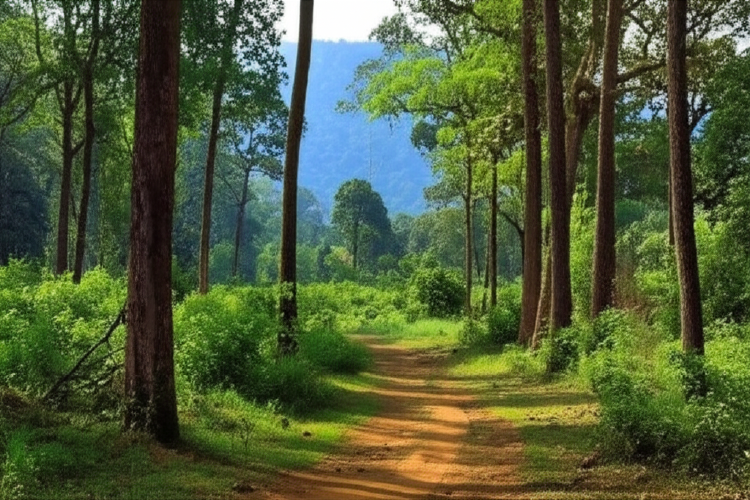Jim Corbett National Park: A Wildlife Wonderland in Uttarakhand
Jim Corbett National Park is India's first national park, established in 1936, located in the Nainital district of Uttarakhand. It is renowned for its diverse wildlife, including tigers, elephants, and a wide variety of bird species. The park also offers breathtaking views of the Himalayan foothills and is a perfect destination for nature enthusiasts and wildlife lovers.
- Muthukrishnan
- 4 min read

Introduction
Jim Corbett National Park, nestled in the Nainital district of Uttarakhand, India, is the oldest national park in Asia, and a haven for wildlife enthusiasts and nature lovers. Spanning a significant area in the foothills of the Himalayas, the park is known for its rich biodiversity and is a cornerstone in India’s conservation efforts. The park’s altitude varies considerably, ranging from 1,200 to 3,600 feet above sea level. Situated close to popular destinations like Nainital and Ranikhet, Jim Corbett offers a contrasting experience – a thrilling encounter with nature versus the more relaxed hill station experience. What makes Jim Corbett truly unique is its pioneering role in Project Tiger, its historical significance, and its stunning natural beauty, offering an unparalleled experience of the Indian wilderness.
History and Cultural Heritage
The history of Jim Corbett National Park is deeply intertwined with its namesake, Edward James Corbett, a legendary hunter turned conservationist. Established in 1936 as Hailey National Park, it was renamed Jim Corbett National Park in 1957 in his honor. Corbett played a crucial role in protecting the area from deforestation and preserving its wildlife. The park’s creation was a pivotal moment in the history of wildlife conservation in India. The park’s culture is predominantly influenced by the indigenous communities that have lived in and around the region for centuries. These communities have traditionally coexisted with the wildlife, relying on the forest for sustenance and resources. While the park’s focus is conservation, you can still find remnants of this cultural interaction in the local villages and their customs. The park area is dotted with old buildings from the colonial era, providing glimpses into its historical past.
Natural Beauty
Jim Corbett National Park is characterized by a diverse landscape, ranging from grasslands and wetlands to dense sal forests and riverine belts. The Ramganga River flows through the park, and its tributaries are vital for the ecosystem. The park is dominated by the Shivalik ranges, which contribute to its rugged terrain and scenic beauty. <image: images/image_jim-corbett-national-park.png
Must-Visit Attractions
The primary attraction in Jim Corbett is, without doubt, the wildlife safari. <image: images/image_jim-corbett-national-park.png
Adventure Activities
The primary adventure activity in Jim Corbett is the wildlife safari. These safaris are conducted in open-top jeeps, allowing visitors to explore different zones of the park and increase their chances of spotting wildlife. <image: images/image_jim-corbett-national-park.png
Local Markets and Handicrafts
While the park primarily focuses on nature and wildlife, the surrounding areas offer opportunities to explore local markets and crafts. The local markets in Ramnagar, the gateway to Corbett, offer various handicrafts, including wooden carvings, cane furniture, and local textiles. <image: images/image_jim-corbett-national-park.png
Food and Cuisine
The cuisine in and around Jim Corbett reflects the regional flavors of Uttarakhand and Uttar Pradesh. <image: images/image_jim-corbett-national-park.png
Flora and Fauna
Jim Corbett National Park is renowned for its rich biodiversity. It is home to a significant population of Bengal tigers, which are the prime attraction. <image: images/image_jim-corbett-national-park.png
Best Time to Visit
The best time to visit Jim Corbett National Park is during the dry season, from mid-November to mid-June. The weather during this period is pleasant, and the chances of spotting wildlife are higher, as animals tend to congregate near water sources. The park is closed during the monsoon season (July to October) due to heavy rainfall, which makes the terrain difficult to navigate. The annual Corbett Festival is also held in the park during this time of year and is a major draw for tourists.
How to Reach
Jim Corbett National Park is well-connected. The nearest airport is the Pantnagar Airport, located about 50 kilometers away. The closest railway station is Ramnagar, which is well-connected to major cities like Delhi and Lucknow. <image: images/image_jim-corbett-national-park.png
Accommodation Options
Jim Corbett National Park offers a wide range of accommodation options to suit different budgets and preferences. There are government-run forest rest houses within the park, such as the Dhikala Forest Rest House, which offer an immersive experience. Outside the park, numerous resorts, hotels, and guesthouses are available in Ramnagar and other nearby areas. <image: images/image_jim-corbett-national-park.png
Offbeat Experiences
For travelers seeking off-the-beaten-path experiences, exploring the nearby villages and interacting with the local communities offers a unique perspective. Volunteering opportunities with local conservation projects or staying in homestays can provide an authentic cultural immersion. <image: images/image_jim-corbett-national-park.png
Conclusion
Jim Corbett National Park is a jewel in the Indian wilderness, offering an unparalleled experience of nature, wildlife, and history. From the thrill of a tiger sighting to the tranquility of the forests, the park offers a range of memorable experiences. Whether you are an avid wildlife enthusiast, a nature lover, or someone seeking a break from the city, Jim Corbett National Park has something for everyone. Explore the beauty, culture, and history of this magnificent destination, and create memories that will last a lifetime.